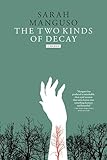
 “There are two kinds of decay: mine and everyone else’s.” This line occurs near the end of Sarah Manguso’s deceptively slim tour de force on illness, mortality, and metaphor, The Two Kinds of Decay, and speaks to the book’s high wire acts of duality and the paradox between the primal narcissism of the individual body vs. the transcendent empathy that makes life more than a solitary hall of mirrors. Manguso — like many great thinkers before her — seems to ultimately bridge the gap between the two through the small-yet-almost-impossible act of learning to pay attention. Throughout The Two Kinds of Decay, we pay attention with her, to the almost unbearably physical descent that befell her in 1995, turning her from a typically self-absorbed Ivy League college student (preoccupied with sex and infiltrating the moneyed classes), to a frequent hospital patient suffering partial paralysis and undergoing treatments every few days to cleanse her own blood of the toxins in her plasma that were trying to poison and kill her. Manguso — also the author of The Guardians, a stunning, poetic memoir on a mentally ill friend’s suicide, is a singular writer, as distinctive and inimitable as Anne Carson, but more accessible, and her books, though unflinchingly unsentimental and devoid of any New Age mumbo jumbo, are tender, deeply spiritual beasts.
“There are two kinds of decay: mine and everyone else’s.” This line occurs near the end of Sarah Manguso’s deceptively slim tour de force on illness, mortality, and metaphor, The Two Kinds of Decay, and speaks to the book’s high wire acts of duality and the paradox between the primal narcissism of the individual body vs. the transcendent empathy that makes life more than a solitary hall of mirrors. Manguso — like many great thinkers before her — seems to ultimately bridge the gap between the two through the small-yet-almost-impossible act of learning to pay attention. Throughout The Two Kinds of Decay, we pay attention with her, to the almost unbearably physical descent that befell her in 1995, turning her from a typically self-absorbed Ivy League college student (preoccupied with sex and infiltrating the moneyed classes), to a frequent hospital patient suffering partial paralysis and undergoing treatments every few days to cleanse her own blood of the toxins in her plasma that were trying to poison and kill her. Manguso — also the author of The Guardians, a stunning, poetic memoir on a mentally ill friend’s suicide, is a singular writer, as distinctive and inimitable as Anne Carson, but more accessible, and her books, though unflinchingly unsentimental and devoid of any New Age mumbo jumbo, are tender, deeply spiritual beasts.
Recommended pairings: I read The Guardians some time ago, but devoured The Two Kinds of Decay — published in 2008 — immediately after Ed Hirsch’s most recent book, Gabriel, a profound meditation on grief and loss both individual and throughout (mainly artistic) history. Reading both Manguso’s books alongside Gabriel and Emily Rapp’s The Still Point of the Turning World, one of the most powerful books of last year, would be strong medicine, but likely more emotionally and intellectually transformative than what most philosophy or theology courses could possibly offer.
More from A Year in Reading 2014
Don’t miss: A Year in Reading 2013, 2012, 2011, 2010, 2009, 2008, 2007, 2006, 2005
The good stuff: The Millions’ Notable articles
The motherlode: The Millions’ Books and Reviews
Like what you see? Learn about 5 insanely easy ways to Support The Millions, and follow The Millions on Twitter, Facebook, Tumblr.










